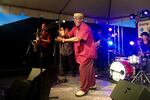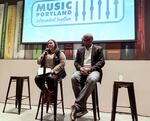Members of the nonprofit group MusicPortland are concerned that the local government is not doing enough to help local music businesses stay afloat.
So, the group presented a seven-point plan outlining specific steps that might help ensure the survival of the city’s music scene.
The plan includes clarification of city regulations, streamlining enforcement and oversight, and reducing the reliance on police in live music settings.

An OPB file photo of Ural Thomas & the Pain at PDX Pop Now in 2018. PDX Pop Now's organizers have signed on to Music Portland's seven-point plan for helping the city's music scene.
Max Robinson / opbmusic
Among the most prominent topics discussed at a meeting Monday between music industry leaders and city commissioners was the way the city currently responds to noise complaints.
One noise regulation ordinance was specifically addressed by MusicPortland board member Jamie Dunphy, who said that the code is too subjective.
“This is the code that has historically been used for police to break up neighborhood parties. This is not supposed to be a code by which a regulated industry is governed,” Dunphy said. “We want a consistent set of standards by which the entire music industry is operating and is judged.”
Dunphy also said that specific police-focused noise code conflicts with another city ordinance enforced by the Portland Noise Program, which monitors noise in decibels based on the location and time of day, and which he says is an objective science-based standard.
Portland Commissioner Mingus Mapps suggested one way to address the noise complaint issue would be to divert noise complaints away from the Portland police and toward other city departments, like the city’s noise program.
“We also need to reimagine public safety so they’re actually focused on keeping the public safe as opposed to harassing your colleagues and shutting down good shows,” Mapps said.
Adam Lyons, communications director at Mapps’ office, said the last time the City Council took up this issue was in the summer, and there are no public meetings planned for the immediate future.
MusicPortland is hoping to keep the issue on the city’s radar.

Portland City commissioners Carmen Rubio, left, and Mingus Mapps speak to a crowd at Revolution Hall about the state of Portland's music industry, Nov. 1, 2021.
Steven Tonthat / OPB
